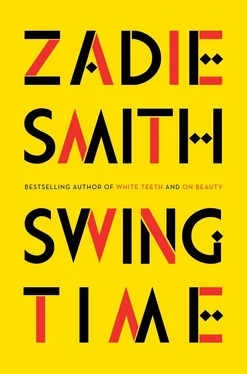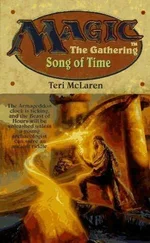Once, when it happened to be just Hawa and me in the yard, and she was plaiting my hair, I tried again to speak of difficult things, exploiting the intimacy of the moment to ask her about a rumor I’d heard, about a vanished village woman, apparently seized by the police, the mother of a young man who’d participated in a recent attempted coup. No one knew where she was, or what had happened to her. “There was a girl who came here last year, her name was Lindsay,” said Hawa, as if I had not spoken at all. “It was before Aimee and you all came, she was from the Peace Corps — she was American and she was really fun! We played Twenty-one and we played Blackjack. You play cards? I tell you, she was really fun, man!” She sighed, laughed and pulled my hair tight. I gave up. Hawa’s own preferred topic was the R&B star Chris Brown, but I had almost nothing to say about Chris Brown and only one song of his on my phone (“That is a very, very, very old song,” she informed me) whereas she knew everything there was to know about the man, including all his moves. One morning, just before she left for school, I spotted her in the yard, dancing with her earphones in. She was dressed in her technically modest yet intensely form-hugging trainee-schoolteacher outfit: a white blouse, long black Lycra skirt, yellow hijab, yellow sandals, yellow watch, and a snug pinstripe waistcoat, which she made sure was pulled especially tight at the back to make a feature of a tiny waist and spectacular bosom. She looked up from where she was admiring the quick steps of her own feet, saw me and laughed: “Don’t you tell my students!”
• • •
Each day of that visit, Carrapichano and I went into the school, visiting Hawa’s and Lamin’s classrooms, making notes. Carrapichano focused on every aspect of the school’s functioning, while my remit was narrower: I went first to Lamin’s class and then Hawa’s, looking for the “best and the brightest,” as I had been instructed by Aimee to do. In Lamin’s class, a maths class, this was easy: I only had to put down the names of the girls who got the right answers. And that’s what I did, waiting each time for Lamin to confirm, on the board, that the answers of the children were correct. For anything beyond basic addition and subtraction was, in truth, beyond my ability, and I watched Lamin’s ten-year-olds multiply more quickly than me and reach long-division answers I could not even stumble toward. I would grip my pen and feel my hands sweating. It was like time travel. I was right back in my own maths classes, I had the same old, familiar feelings of shame, and still retained, as it turned out, my childhood habit of self-deception, covering my workings with my hand as Lamin passed by and always managing to half convince myself, once the answer was up on the board, that I had been very close to getting it all along, but for this or that small error, the terrible heat in the room, my own irrational anxiety in the face of numbers…
I was relieved to leave Lamin and head to Hawa’s session, a general class. There I had decided to look for the Traceys, that is, for the brightest, the quickest, the most willful, the lethally bored, the troublesome, the girls whose eyes burned like lasers straight through the government-issued English sentences — dead sentences, sentences devoid of content or meaning — that were being laboriously transcribed in chalk up on to the board by Hawa before being equally laboriously translated back into Wolof and thus explained. I had expected to find only a few Traceys in each class, but it soon became clear that there were more of Tracey’s tribe in those hot rooms than anyone else. Some of these girls’ uniforms were so worn they were now little more than rags, others had open sores on their feet or eyes weeping pus, and when I watched the school fees being paid into the teachers’ hands each morning in coins, many did not have their coin to give. And yet they had not given up, these many Traceys. They were not satisfied with singing their lines back to Hawa, who herself, only a few years earlier, must have sat in these seats, singing these same lines, clinging to her textbook then as she did now. Watching all that fire with so little kindling, it was of course easy to despair. But each time the conversation was freed from its pointless English shackles and allowed to fall back into the local tongues I would see it again, the clear sparks of intelligence — like flames licking through a grille meant to smother them — and taking the same form natural intelligence takes in classrooms around the world: backchat, humor, argument. It was Hawa’s unfortunate duty to silence all of this, all natural inquiry and curiosity, and drag the class back to the government textbook in hand, to write The pot is on the fire or The spoon is in the bowl with a piece of broken chalk on the board, and have them repeat it, and then to have them write this down, copying it exactly, including Hawa’s own frequent errors. After watching this painful process for a few days I realized that she never once tested them on these written lines without the answer being already front of them, or having just been repeated, and one especially hot afternoon I felt I had to resolve the question for myself. I asked Hawa to sit where I sat, on a broken stool, so I could stand up before the class and ask them to write in their books: The pot is on the fire . They looked up at the empty board, and then expectantly at Hawa, awaiting the translation. I wouldn’t let her speak. Two long minutes followed, as children stared blankly at their half-ruined exercise books, re-covered many times over in old wrapping paper. Then I went around the room, collecting the books to show to Hawa. Some part of me enjoyed doing this. Three girls in forty had written the sentence correctly in English. The rest had one word or two, almost all of the boys had no written letters at all, just vague markings reminiscent of English vowels and consonants, the shadows of letters but not letters themselves. Hawa nodded at each book, betraying no emotion, and then, when I had finished, stood up and continued her class.
• • •
When the bell rang for lunch I ran across the yard to find Carrapichano, who was sitting under the mango tree, making notes in a pad, and told him in an excitable hurry all the events of the morning, and the implications as I saw them, imagining how slow my own progress might have been if my teachers had taught our curriculum in, say, Mandarin, though I spoke Mandarin nowhere else, heard no Mandarin, had parents who spoke no Mandarin…
Carrapichano put his pen down and stared at me.
“I see. And what is it you think you just achieved?”
At first I thought he hadn’t understood me, so restated my case from the top, but he cut me off, stamping a foot in the sand.
“All you did was humiliate a teacher. In front of her class.”
His voice was quiet but his face very red. He took off his glasses and glared at me, and looked so gravely handsome it lent a certain weight to his position, as if those who are right are always more beautiful.
“But — it’s — I mean, I’m not saying it’s a question of ability, it’s a ‘structural issue’—you always say that yourself — and I’m just saying maybe we could have an English lesson, OK, of course, but let’s teach them in their own languages in their own country, and then they can — they could, I mean, you know, take English tests home, as homework or something.”
Fernando laughed bitterly and swore in Portuguese.
“Homework! Have you been to their homes? Do you see books on their shelves? Or shelves? Desks?” He stood up and started shouting: “What do you think these children do when they get home? Study? Do you think they have time to study?”
Читать дальше












